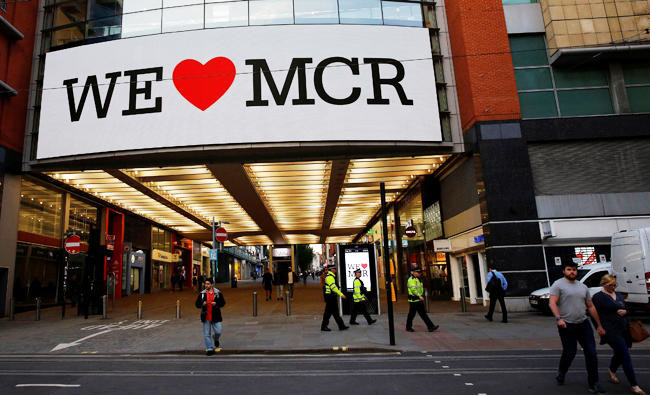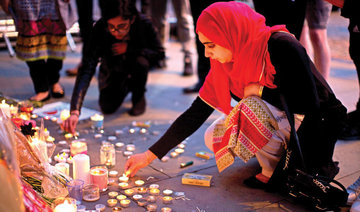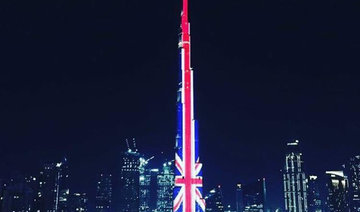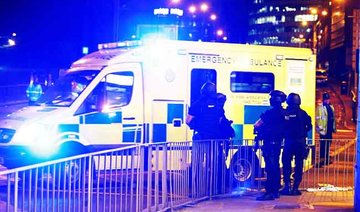MANCHESTER: Less than 24 hours after the worst atrocity ever to hit the city, the streets of central Manchester were thronging with people on Tuesday night, as thousands turned out to pay tribute to the dead and injured in a show of defiance and solidarity in the face of terror.
Newly elected mayor Andy Burnham, a former Labour Party cabinet member, called the vigil in the city’s Albert Square. Earlier, after what was described as “Manchester’s darkest night,” Burnham praised the positive reaction of Mancunians, declaring: “Even in the minutes after the attack they opened their doors to strangers and drove them away from danger. They have the best possible response to those who seek to divide us. And it will be that spirit of Manchester that will prevail and hold us together.”
City Council leader Sir Richard Leese, in office for just three weeks when an IRA bomb struck Manchester in 1996, said: “Manchester has had some dark days in the past but I can’t think of anything that matches the horror of what happened (on Monday) night. But the community is coming together and we will not allow this to divide us just as we have not allowed events in the past to divide us.
“As the citizens of Manchester demonstrated… when they came out to give support to people whatever their needs were, this city will pull together and we will make sure the city will go on from strength to strength. A dark day yes, but something that Manchester, in its own unique way, that turns into a strength for us as a city by working together.”
Twenty-one years ago, when the biggest bomb ever detonated on the British mainland in peacetime devastated Manchester city center, the IRA had given a coded warning, which enabled police to shepherd 80,000 people to relative safety.
More than 200 people were wounded, but the fact that no-one was killed gave rise to legend of the “Miracle of Manchester.”
Last night there was no warning before the atrocious suicide bomb attack on the Manchester Arena, packed with 20,000 young pop music fans. There was no miracle. At least 22 people died — the youngest of the confirmed victims was aged just 8 — and 59 or more injured, with many children among the victims.
The contrast between the two attacks speaks volumes about how the nature of terrorism has changed. In 1996 the IRA saw fit to issue a warning, hardly gallant of them given the size of the explosive device deployed in a busy city center, but perhaps it demonstrated an intention to avoid civilian casualties, however slender.
Moreover, in the case of the IRA it was at least possible to discern a political motive for the attack, however inexcusable the tactics. Neither of those caveats apply to Monday night’s outrage. The prime intention of the suicide bomber, named as 22-year-old Manchester-born Salman Abedi, was clearly to kill as many people as possible with a bomb said to be packed with nuts, bolts and nails.
Nor is it possible to fathom any possible aim that this act of terror was supposed to assist. Like the recent attacks in London and wider world, this was pure nihilistic evil.
If there was no specific warning before the bombing of the arena, security services have long been saying it was not “if” the next atrocity was coming but “when.” There have been plots to attack the Arndale shopping center and Old Trafford football stadium — thwarted by police.
Tragically this one got through, and it seems to have been meticulously planned. The timing of the explosion, as fans were leaving the auditorium en masse, was probably entirely deliberate. And the exact spot in the foyer where the bomb was detonated would not have required the bomber to confront security and enter the arena proper.
Manchester has been here before and reacted in the same way. At the vigil people embraced each other. One said: “Love is the only thing we can do when we are facing hate.”
Dave Haslam, former DJ at Manchester's once-legendary Hacienda nightclub, tweeted: “You’ve got the wrong city if you think hate will tear us apart.” There were almost 50,000 reactions within hours.
• Ray King was a journalist at the Manchester Evening News for 34 years. His book about the IRA bombing of 1996, Detonation — Rebirth of a City, is available on Kindle.
Manchester: A show of solidarity in the face of terror
Manchester: A show of solidarity in the face of terror

South Korea’s Yoon set to avoid arrest by warrant deadline

- Anti-graft investigators sought an extension to the warrant that expires at the end of Monday
- The anti-graft officials have sought more time and help because of the difficulties they have faced
The former star prosecutor has defiantly refused questioning three times over a bungled martial law decree last month and remained holed up in his residence surrounded by hundreds of guards preventing his arrest.
Anti-graft investigators sought an extension to the warrant that expires at the end of Monday (1500 GMT) and asked for support from the police, which said the force would help and may arrest anyone shielding Yoon.
“The validity of the warrant expires today. We plan to request an extension from the court today,” said CIO deputy director Lee Jae-seung, whose authority has been refuted by Yoon’s lawyers.
The request was officially filed on Monday evening and an extension can be granted all the way up to the midnight deadline. If the warrant expires, investigators can apply for another one.
The anti-graft officials have sought more time and help because of the difficulties they have faced, including being met by hundreds of security forces when they entered Yoon’s presidential compound on Friday.
“We will consider the option of arresting any personnel from the Presidential Security Service during the execution of the second warrant,” a police official said Monday, speaking on condition of anonymity.
The country’s opposition Democratic Party has also called for the dissolution of the security service protecting the impeached president.
If authorities detain Yoon, who has already been suspended from duty by lawmakers, he will become the first sitting president in South Korean history to be arrested.
But they would only have 48 hours to either request another arrest warrant, in order to keep him in detention, or be forced to release him.
While officials have been unable to get to Yoon, the joint investigation team has gone after top military officials behind the martial law plan.
The prosecution’s martial law special investigation unit on Monday indicted Defense Intelligence Commander Moon Sang-ho on charges of playing an integral role in an insurrection and abuse of power.
Yoon would face prison or, at worst, the death penalty if convicted for insurrection over briefly suspending civilian rule and plunging South Korea into its worst political crisis in decades.
But both he and his supporters have remained defiant.
“We will protect the Presidential Security Service till midnight,” said Kim Soo-yong, 62, one of the protest organizers.
“If they get another warrant, we will come again.”
Early Monday dozens of Yoon’s lawmakers from the People Power Party turned up in front of his presidential residence and police blocked roads.
“I’ve been here longer than the CIO now. It doesn’t make sense why they can’t do it. They need to arrest him immediately,” said anti-Yoon protest organizer Kim Ah-young, in her 30s.
The initial warrant was issued on the grounds that Yoon has refused to emerge for questioning over his martial law decree.
His lawyers have repeatedly said the warrant is “unlawful” and “illegal,” pledging to take further legal action against it.
The vibrant East Asian democracy will find itself in uncharted territory either way — its sitting president will have been arrested, or he would have evaded court-ordered detention.
US Secretary of State Antony Blinken arrived in Seoul early Monday, and did not meet Yoon but held a joint news conference with Foreign Minister Cho Tae-yul.
He praised Seoul’s democratic resilience but his focus was shifted away from domestic politics when North Korea fired what appeared to be an intercontinental ballistic missile into the sea as he met Cho.
South Korea’s Constitutional Court has slated January 14 for the start of Yoon’s impeachment trial, which if he does not attend would continue in his absence.
A prosecutors’ report for his former defense minister seen by AFP Sunday showed Yoon ignored the objections of key cabinet ministers before his failed martial law bid, evidence the court may take into account.
South Korea’s Constitutional Court has up to 180 days to determine whether to dismiss Yoon as president or restore his powers.
Former presidents Roh Moo-hyun and Park Geun-hye never appeared for their impeachment trials.
Malaysia’s jailed ex-PM Najib wins appeal to seek home detention for corruption sentence

- Najib set up the 1MDB development fund shortly after he took office in 2009.
- Investigators allege at least $4.5 billion was stolen from the fund and laundered by Najib’s associates through layers of bank accounts in the United States and other countries
PUTRAJAYA: Malaysia’s imprisoned former Prime Minister Najib Razak on Monday won an appeal to pursue his bid to serve his remaining corruption sentence under house arrest.
In an application in April last year, Najib said he had clear information that then-King Sultan Abdullah Sultan Ahmad Shah issued an addendum order allowing him to finish his sentence under house arrest. Najib claimed the addendum was issued during a pardons board meeting on Jan. 29 last year chaired by Sultan Abdullah that also cut his 12-year jail sentence by half and sharply reduced a fine. But the High Court tossed out his bid three months later.
The Court of Appeals, in a 2-1 ruling on Monday, ordered the High Court to hear the merits of the case. The decision came after Najib’s lawyer produced a letter from a Pahang state palace official confirming that then-Sultan Abdullah had issued the addendum order.
“We are happy that finally Najib has got a win,” his lawyer Mohamad Shafee Abdullah said. “He is very happy and very relieved that finally they recognized some element of injustice that has been placed against him.”
The lawyer said Najib gave a thumbs-up in court when the ruling was read.
He said it was “criminal” for the government to conceal the addendum order. Shafee noted that a new High Court judge will now hear the case.
In his application, Najib accused the pardons board, home minister, attorney-general and four others of concealing the sultan’s order “in bad faith.” Sultan Abdullah hails from Najib’s hometown in Pahang. He ended his five-year reign on Jan. 30 last year under Malaysia’s unique rotating monarchy system. A new king took office a day later.
Home Minister Saifuddin Nasution Ismail has said he had no knowledge of such an order since he wasn’t a member of the pardons board. The others named in Najib’s application have not made any public comments.
Najib, 71, served less than two years of his sentence before it was commuted by the pardons board. His sentence is now due to end on Aug. 23, 2028. He was charged and found guilty in a corruption case linked to the multibillion-dollar looting of state fund 1Malaysia Development Berhad.
The pardons board didn’t give any reason for its decision and wasn’t required to explain. But the move has prompted a public outcry over the appearance that Najib was being given special privileges compared to other prisoners.
Najib set up the 1MDB development fund shortly after he took office in 2009. Investigators allege at least $4.5 billion was stolen from the fund and laundered by Najib’s associates through layers of bank accounts in the United States and other countries, financed Hollywood films and extravagant purchases that included hotels, a luxury yacht, art and jewelry. More than $700 million landed in Najib’s bank accounts.
Najib is still fighting graft charges in the main trial linking him directly to the scandal.
Death toll from the German Christmas market attack rises to 6

- A woman succumbed to her injuries, prosecutors said Monday
- More than 200 people were injured in the Dec. 20 attack
BERLIN: The death toll in the attack on a Christmas market in the German city of Magdeburg last month has risen to six as a woman succumbed to her injuries, prosecutors said Monday.
Prosecutors in Naumburg said the 52-year-old woman died in a hospital, German news agency dpa reported. Authorities have said that the others who died were four women aged 45, 52, 67 and 75, and a 9-year-old boy.
More than 200 people were injured in the Dec. 20 attack.
Authorities have identified the suspect, who was arrested immediately after he drove a rented car through the crowded market early on a Friday evening, as a Saudi doctor who arrived in Germany in 2006 and had received permanent residency.
They have said he does not fit the usual profile of perpetrators of extremist attacks. The man described himself as an ex-Muslim who was highly critical of Islam, and on social media expressed support for the far-right.
Norway PM worried by Musk involvement in politics outside US

- The German government accused Musk of trying to influence Germany’s upcoming election
- Musk spent more than $250 million to help Trump get elected
OSLO: Norway’s Prime Minister Jonas Gahr Stoere said on Monday that he found it worrying that billionaire Elon Musk was involving himself in the political issues of countries outside of the United States.
Musk, a close ally of US President-elect Donald Trump, last month endorsed a German anti-immigration, anti-Islamic political party ahead of that country’s national elections in February, and recently made remarks on British politics.
“I find it worrying that a man with enormous access to social media and huge economic resources involves himself so directly in the internal affairs of other countries,” Stoere told Norwegian public broadcaster NRK.
“This is not the way things should be between democracies and allies,” he added.
If Musk were to involve himself in Norwegian politics, the country’s politicians should collectively distance themselves from such efforts, Stoere said.
Musk, the world’s richest person, spent more than $250 million to help Trump get elected and has been tasked by Trump to prune the federal budget as a special adviser.
The German government last week accused Musk, who owns social media platform X and is CEO of Tesla and SpaceX, of trying to influence Germany’s upcoming election with a guest opinion piece for the Welt am Sonntag newspaper.
German Vice Chancellor Robert Habeck said Musk’s support for Germany’s far-right Alternative for Germany (AfD) was a “logical and systematic” play by the billionaire for a weak Europe that will not be able to regulate as strongly.
Russia says captured key town in eastern Ukraine

MOSCOW: Russian forces have captured the town of Kurakhove in eastern Ukraine, Russia’s defense ministry said on Monday, in a key advance after months of steady gains in the area.
Russian units “have fully liberated the town of Kurakhove — the biggest settlement in southwestern Donbas,” the ministry said on Telegram.












